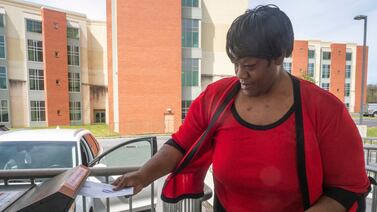A version of this post was originally distributed in Votebeat’s weekly newsletter. Sign up here.
This week brought more evidence that elections are being threatened from the inside. First I broke the news of Cleta Mitchell’s appointment to the Election Assistance Commission’s Board of Advisors, and spent the week reporting out how exactly this happened.
Then, the Washington Post broke the news Friday that a county election administrator in Ohio likely compromised his office’s security to give Mike Lindell, a pillow salesman, access to election office data.
I’ve written about this problem before, describing the troubling tentacles of the Trump campaign’s bogus fraud claims and the real impacts they have had on people and on policies. And still, election administrators across this country hesitate to speak out and only rarely put their names on their quotes when they do.
As I reported the story about Mitchell, election administrators would not even go on the record to criticize the Trump ally’s appointment, despite it being abundantly clear that her attempted election subversion in 2020 should disqualify her from the role. I was offered credible quotes about her lack of scruples, how insulting her appointment was to local election administrators, how her appointment would harm the EAC’s credibility and more. But no one was willing to put their name on these generally uncontroversial statements.
I want to be clear that there are shining examples of election administrators, legislators, and county employees giving no effs and putting their views out there, name attached, in order to speak truth to power. Rusty Bowers, the Republican speaker of the House in Arizona, made news this week when he told the Arizona Republic the inside story of the Senate’s partisan audit. Similarly in Georgia, Republicans Brad Raffensperger, Jordan Fuchs, and Gabriel Sterling have all individually faced consequences for candidly speaking out against Trump and other anti-election extremists. There are dozens of similar examples, like Meagan Wolfe, Chris Davis, and Cathy Darling Allen.
I also want to be clear that I know that it is a uniquely impossible time for election administrators, many of whom are readers of this newsletter. I know that you have received threats and that some of your families have been negatively affected. And I know that trust in election administrators is low, even as they are largely not to blame for that mistrust. But here’s what I also know: Not many Americans trust the media, either, and they certainly don’t trust us more when we hide the names of government sources who are raising the red flag. I understand the value of background quotes, I did a whole podcast episode on the practice, but I now receive an untenable number of requests for anonymity a week, more than I have ever received.
You might think it’s professionally convenient for me to urge you to be candid, because it makes my reporting easier and makes Votebeat stories stronger. But this is not about me or Votebeat — it’s about something bigger. In our national conversation about voting, as is always the case, the loudest voices are the ones who get heard, and trustworthy election administrators are far quieter than their badly behaved counterparts. Democracy is in crisis, and we hamper the solutions when the people closest to the problems remain on the sidelines, hoping not to be noticed and simply doing their jobs.
Votebeat is committed to doing the hard work to bring transparency to this space. This week, I spent three days unraveling the mystery of how someone like Cleta Mitchell could be appointed to a board that, frankly, relatively few people have heard of. It is the type of work I love to do — shining light into places no one else looks. But I can’t do it if sources won’t stand near the flashlight and point the way.
Ohio is now the third state where county election administrators have materially compromised the security of their systems. In Pennsylvania, several Trump-aligned Republicans won local election judge posts to supervise next year’s polling places. At the state level, legislatures are passing damaging voting laws. At the federal level, conservatives have won positions to influence civil rights and voting according to their agendas. The loudest, most irresponsible voices are getting the coverage – because they are the ones willing to get out ahead of the news, shaping it, instead of reacting to it.
The media has a lot to do to improve its coverage of elections, but we cannot do that with honesty and integrity unless there’s an equal commitment by the people who manage this country’s elections to be transparent and brave enough to say things on the record. It’s a hard thing to do — I know. I ask people to do difficult things for journalism every single day, and I see what happens to sources when journalists are careless with facts. But this will never change if we don’t put an end to this charade. As it stands, I’m sitting on a list of important stories that I simply cannot publish because many people in this space will not go on the record.
Just as there is a massive lack of understanding about how election administrators do their jobs, readers likewise do not understand why and when journalists allow anonymous quotes. When given a choice between believing a named person making false statements about elections and a nameless person correcting the record, it is not difficult for most people to believe the person whose name they can see. From here on out, Votebeat will adhere to our strict rules on who we allow to speak on background and for what reason.
It is more difficult than it has ever been to publicly own an opinion. Believe me, I know. But I also know that it will remain difficult if we do not radically change our approach to transparency in this space. We cannot build trust in elections by quoting nameless sources, and I am urging every election administrator who reads this newsletter to stop asking me to.
Back Then
One thing I think should be anonymous is votes. The first American experiment with an anonymous ballot, or an “Australian ballot” — initially called that because of its Australian origins — took place in Louisville, Kentucky, in 1888. It was, however, seen as an obstacle for participation by the poor, who were often illiterate. In several states, voter assistance was allowed for the first time in order to solve this problem. Both anonymous ballots and voter assistance continue, of course, to this day.
In Other Voting News
- This week we co-published a profile of Texas Secretary of State John Scott with Texas Monthly. The Republican lawyer who briefly represented the Trump campaign in a 2020 lawsuit has some qualifications that might surprise liberals: deep knowledge of elections, a goal to restore trust to the system, and the respect of Texas Democrats. “I want to illuminate the efforts that go into having a fair election,” he told me, “because I think anybody that thinks they’re not having a fair election may decide not to vote.”
- North Carolina Republicans have forced through legislation that would move up its deadline for the receipt of absentee ballots. A settlement ahead of the November 2020 vote allowed nine additional days, and Republicans sought to reel the date back in. They have also barred elections officials from accepting private grant money. Democratic Gov. Roy Cooper will almost certainly veto the legislation.
- Pennsylvania Republicans have announced the contractor that will conduct an investigation into the state’s 2020 election. The state will pay the Iowa-based firm, Envoy Sage, $270,000 for a six-month contract, which can be extended if necessary, say Republicans. The firm is best known for its work on defense projects.
- “After months of investigating what led New York’s elections to become a national laughingstock, the state is finally ready to make some changes,” writes News 12. The state Senate Elections Committee has released a 40-page report detailing proposed changes, including shrinking the New York City Board of Elections and restructuring local boards of elections.
- Colorado, like many states, has begun the redistricting process for local lines, such as county commissioner districts, now that state and federal lines have been drawn. The Grand Junction Sentinel has a great writeup of the process, which in Mesa County will be overseen by former SoS Wayne Williams and County Treasurer Sheila Reiner while Clerk Tina Peters remains relieved of election-related duties.
- The Elko County, Nevada, Republican Party has asked the county to stop using Dominion machines due to “evidence of vote count tampering in places where Dominion voting machines have been used.” There is in fact no such evidence, and the Elko County clerk says she is happy with the machines, though she said she would research voting equipment from another company.
- Now that Rhode Island has moved to electronic poll books, the state has no need for the suitcases that workers carried paper poll books in for years. One local board of canvassers, after cleaning out their offices, has donated the bags to a men’s homeless shelter.
In Voting-Tech News
By Francois Barrilleaux, Votebeat
After many years of delays and resistance, San Francisco is moving ahead with a pilot program for using open-source voting technology. The city first began attempts to transition to open-source voting technology in 2006 and now hopes to use the new systems in its 2022 general election. The program would be run by a partnership between the San Francisco Elections Department and the local nonprofit group VotingWorks.
Open-source voting technology would provide the public with free access to the computer code that election systems run on. Advocates for open-source code say that it would make elections more transparent by giving experts and the public the ability to freely use and scrutinize voting systems, most of which are currently a black box because they are privately owned by a few major for-profit election technology companies. Open-sourcing election technology could also appease citizens and parties that are concerned with whether votes are being accurately counted. But to realize any of these benefits, experts note that the community will have to devote attention and resources to properly analyze open-source voting systems for flaws, something which has not always been done in the past. VotingWorks’ open-source system could also save money over the increasingly expensive Dominion Voting system the city has been paying for.
Only time will tell whether open-source voting can live up to the hype and make our elections more transparent and secure.








